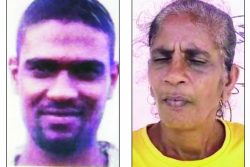Dear Editor,
UN Resident Coordinator Khadija Musa was evasive enough in her response regarding the statements she made to Kaieteur News (May 15) for me to ask for further clarifications. However, I am going to accept her new statements as being sincere.
The issue of race and identity erupts in the press from time to time. The eruption always surrounds the issue of Indian identity. Africans can be proud Africans, as they should be. And we all encourage Amerindians to honour and even preserve their customs and traditions. Not so with Indians.
If I say that I am Indian, this statement is seen by a significant number of Guyanese citizens as being assertive and the assertiveness is further perceived as an infringement on every other group’s identity. I am then abused as a racist and supremacist who is creating divisiveness and disunity.
This idea has its roots perhaps in colonial times when our European masters tried their best to colonise the Indian into Christianity and into European ways and habits. Indian beliefs, traditions, names, foods, etc, all made us pagan in their eyes.
However, Indians refused to become mimic men and women and, even as we have evolved in order to live comfortably in the West, we have maintained enough of our ancestral past to give us a definitive Indian identity. This identity also offends self-hating Indians who are promoted by sections of our society as the politically correct Indian. To be politically correct and acceptable you must deny your Indian identity, a process that results in cultural loss on the part of the Indian.
The UN Declaration on Cultural Diversity, agreed on after 9/11, reaffirms the UN’s initial declaration on human rights and goes further. It begins with the statement: “The cultural wealth of the world is its diversity in dialogue.”
All of the 12 articles are beautifully written and I will share just part of the preamble: “The Universal Declaration makes it clear that each individual must acknowledge not only otherness in all its forms but also the plurality of his or her own identity, within societies that are themselves plural.”
The Guyana Constitution also protects my right as an Indian in Guyana. However, I would much prefer to live in a country where I do not have to remind my fellow citizens of my legal rights to my identity from time to time.
I would much prefer to live in a country where it is a matter of course, as for every other group, because we are all intelligent, gracious, and respectful of each other and each other’s otherness.
Yours faithfully,
Ryhaan Shah






